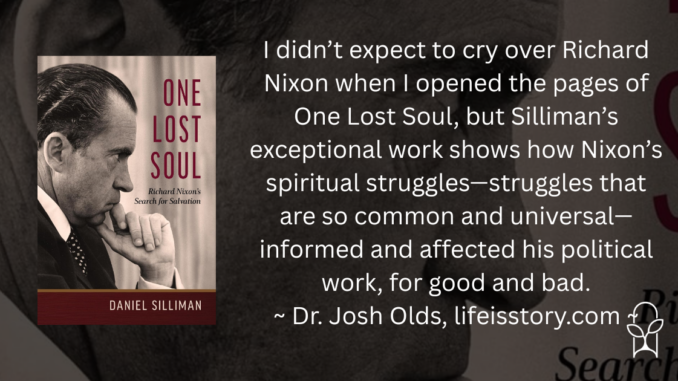
Also by this author: Reading Evangelicals: How Christian Fiction Shaped a Culture and a Faith
Series: Library of Religious Biography
Published by Eerdmans on August 8, 2024
Genres: Academic, Non-Fiction, Biography
Buy on Amazon
Goodreads

Impious and amoral, petty and vindictive, Richard Nixon is not the typical protagonist of a religious biography. But spiritual drama is at the heart of this former president’s tragic story.
The night before his resignation, Richard Nixon wept—and prayed. Though his demanding parents had raised him Quaker, he wasn’t a regular churchgoer, nor was he quick to express vulnerability. As Henry Kissinger witnessed Nixon’s loneliness and humiliation that night, he remarked, “Can you imagine what this man would have been had somebody loved him?”
In this provocative and riveting biography, Daniel Silliman cuts to the heart of Nixon’s tragedy: Nixon wanted to be loved by God but couldn’t figure out how. This profound theological struggle underlay his successes and scandals, his turbulent political career, his history-changing victories, and his ultimate disgrace. As Silliman narrates the arc of his subject’s life and career, he connects Nixon’s character to religious influences in twentieth-century America—from Cold War Christianity to Chick tracts.
Silliman paints a nuanced spiritual portrait of the thirty-seventh president, just as he offers fresh insight into US political and religious history. Readers who lived through Watergate will discover a new perspective on an infamous controversy. A historical page-turner, One Lost Soul will surprise and absorb students, scholars, and anyone who likes a good story.
It’s hard to feel empathy for Richard Nixon, but in One Lost Soul: Richard Nixon’s Search for Salvation, Daniel Silliman manages to paint a complex portrait of a lost and troubled man whose search for validation and salvation led him to the heights of political power—and left him empty. Silliman’s thesis throughout is that Nixon’s theological struggle to accept and feel the love of God was foundational to his successes and scandals, his quest for power and the corruption and immorality that inevitably followed. Whether you’re a presidential scholar or a layperson whose knowledge of Nixon ends with Watergate and “I am not a crook,” Silliman offers an incisive portrait of the thirty-seventh president.
One Lost Soul begins with a quote from Henry Kissinger that summarizes the potential and tragedy of Richard Nixon: “Can you imagine what this man would have been had somebody loved him?” The truth is, though, that Nixon was loved. It was his ability to accept that love—driven in part by a difficult childhood—that always stymied him. Silliman moves chronologically through Nixon’s life with the majority of the time spent on Nixon’s presidency. The first chapter covers his upbringing and the first twenty years of his life. The second calls him a “Cold Warrior Christian” and traces how the new congressman, caught up in the political battle against Communism, found a type of faith and religious calling that energized him.
Silliman goes on to recount Nixon’s relationship with Billy Graham as Nixon moved up the ranks to the Senate and eventually the Vice Presidency. One Lost Soul does a great job of maintaining the religiosity of the religious biography, tying Nixon to the cultural and religious milieu of his time and how that affected him politically and personally. You can grasp how Nixon used Christianity—and sought to find solace in it—to gain and maintain power. And you know how it ends. The discussion of Watergate is simple and straightforward. The one thing that I felt might have been missing was a discussion of how those in the Christian world, evangelicalism in particular (such as Nixon’s friend Billy Graham), viewed him post-scandal and whether or not a different reaction from them would have benefitted Nixon spiritually.
The final chapter details Nixon’s post-presidency and his efforts to redeem himself. Silliman ends: “A little after 9p.m. on April 22, 1994, Richard Nixon, the boy from Yorba Linda, the man who disgraced the presidency, passed from this life into the arms of the God who loved him, even though he never really believed that was true.” I didn’t expect to cry over Richard Nixon when I opened the pages of One Lost Soul, but Silliman’s exceptional work shows how Nixon’s spiritual struggles—struggles that are so common and universal—informed and affected his political work, for good and bad. Knowledge of Nixon in pop culture is somewhat caricatured. Silliman offers readers a realistic rendering. He doesn’t remove Nixon’s flaws or seek to justify them, but helps us see the president as God sees him: a child to be loved.
